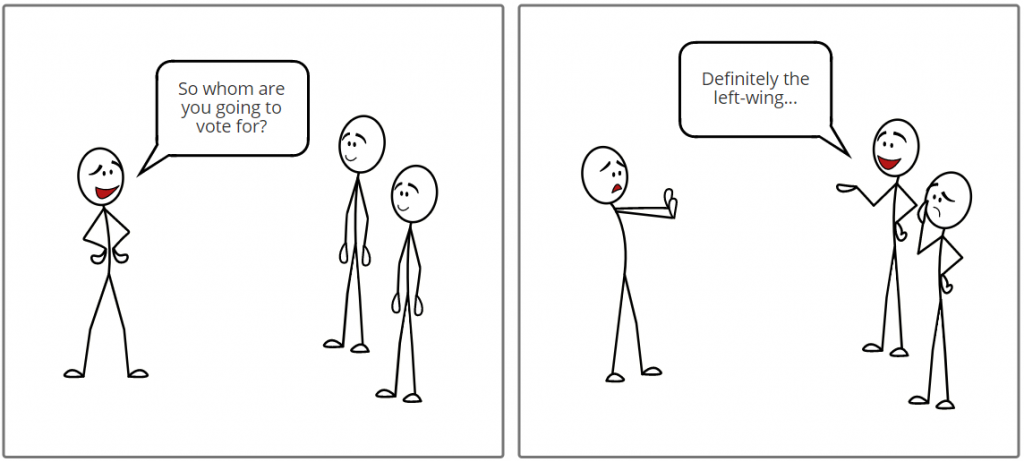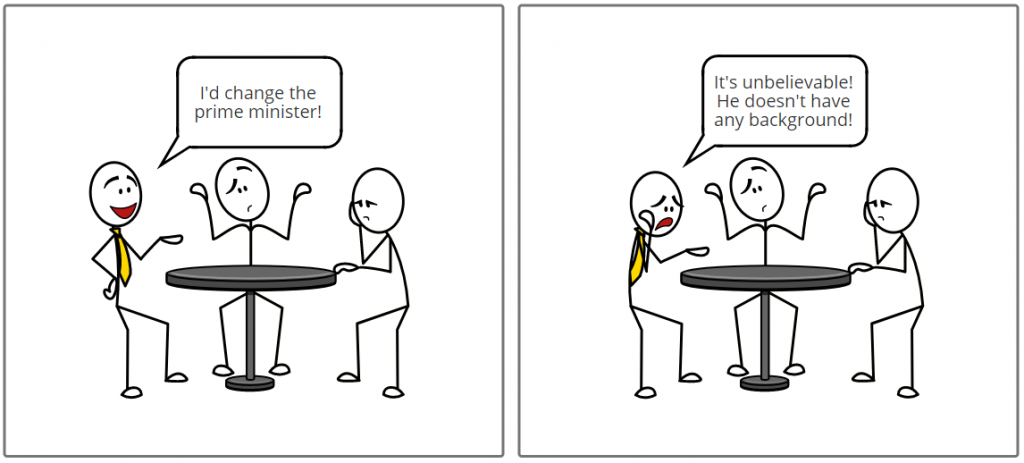
There are a couple of topics which you are discouraged from talking about at work. Typically, those are related to politics, religious beliefs and sexual orientation. It’s advisable to steer clear of them, especially if you work in a highly diverse environment with people who come from different parts of the world. You can sometimes even read about this issue in the company’s code of conduct. For instance:
“You must not promote any political or personal views or beliefs (…)”
As a person who questions everything, I was determined to analyze why those rules exist and what could happen if everybody started to exchange their political outlook. The question “what could be so wrong about sharing personal beliefs with other colleagues” arose.
The ignition of conflict
These topics can ignite a conflict. Starting any political discussion at work or at a party is almost always a bad idea. After a while, you’ll see people fighting with each other and in the end the discussion won’t result in any type of constructive conclusion.

Since different countries have different politics, I suggest paying attention to beliefs of people who live abroad, especially those from countries like the US, where you can find strongly opposing political views. The two parties, Republicans and Democrats, divide the society into two groups. Moderate voices usually lose their power to those two parties. As a consequence, chances are extremely high you’ll meet people belonging to one of these groups and you’ll end up with a 50% chance of saying something the others won’t accept. And then it’s just a major conflict getting closer and closer.
Nobody cares about your beliefs. For real.
Everyone knows somebody who likes to argue about politics. Now, picture this. You go to the canteen to have enjoyable lunch and to take a break between tough meetings. You sit at a table, you joke around and then suddenly some guy starts a dispute about the political situation in the country.

The prime minister is hopeless, taxes are too high and each year it just keeps getting worse and worse. Sounds familiar? What is the point of making a grandiloquent speech about your political views, especially when you know that other people have different beliefs?
Your colleagues are the most important assets you can have at work. The less support you have from other people, the less likely you are to succeed in your company. Any topic that alienates you from your coworkers is harmful to you. Instead of being treated as a “social butterfly” you will be seen as the “weird guy”, and as an opponent. There is also a fair chance of making someone feel uncomfortable when you say something that your colleagues will not be able to conform to.
But maybe I will change somebody’s mind
I asked a bunch of people why they would start such arguments during lunch. What was the purpose of trying to persuade others of their political beliefs? The answer was “maybe I will help change someone’s opinion“. But what does the science say about that kind of approach?
People do feel uncomfortable when they need to confront their current outlook with opposing views. There was a study [1] which revealed that people tend to avoid information they disagree with. During this study, its participants were asked to read articles about controversial topics, e.g. same-sex marriage, guns, marijuana, climate change and abortion. Issues that people often argue about not only on TV but also at work, during family meetings and parties.
They were offered $7 for reading an article supporting their current beliefs and $10 for an article describing the other side. Around two thirds of participants avoided the opportunity to earn more. The result was that:
“Ideologically committed people are similarly motivated to avoid ideologically crosscutting information.”
They read articles that supported their opinions. It was true for both sides. Both Democrats as well as Republicans were equally likely to avoid nonconforming information. It means that people are not very eager to change their current beliefs. They’d rather stay in their comfortable ideological bubble.
Our brain messes up the facts
Ok, but what if you have strong arguments that could win a heated discussion? I know that you probably do. But according to results found by cognitive scientists, Hugo Mercier and Dan Sperber, our reasoning evolved to the point of not seeking for the truth but rather fulfilling our social needs. You can read more about that in one of my previous articles called: why do we ignore facts?
In their book entitled The Enigma of Reason [2], Hugo Mercier and Dan Sperber proved that we tend to look for information that supports our current beliefs. We consider contradicting materials invalid, so we reject them. It lets us fall into confirmation bias.
That means it will be hard to change their mind
Yes, it will! If you manage to make someone uncomfortable by starting an argument, you’ll have slim chances of inspiring them and changing their mind. There is nothing worse and harmful than proving someone wrong, especially if it happens in front of other colleagues. It’s a huge blow to the ego, so it will negatively impact your relationship. Instead of being treated as a friend you will be treated as an enemy.
Conclusion
I’m not saying you shouldn’t talk about politics at all. But if you want to talk about politics or any emotional topic for that matter, don’t try to persuade others of your point of view. Even if you end up winning with your perfectly prepared arguments, it doesn’t mean it will be beneficial to your workplace relationships.
You need to sincerely ask yourself whether you’d rather make friends or enemies. I know it is tempting to win battles and show your opinion is the only right one, but sometimes it may be in your best interest to hold on.
Take a deep breath, smile, let the others speak and just listen to their insights as if you were watching TV or a vlog. Sometimes having “the right” opinion is less valuable than having a good relationship.
References
[1]Frimer, Jeremy & Skitka, Linda & Motyl, Matt. (2017). Liberals and conservatives are similarly motivated to avoid exposure to one another’s opinions. Journal of Experimental Social Psychology. 72. 10.1016/j.jesp.2017.04.003.
[2] Hugo Mercier, Dan Sperber. (2017). The Enigma of Reason. Harvard University Press.